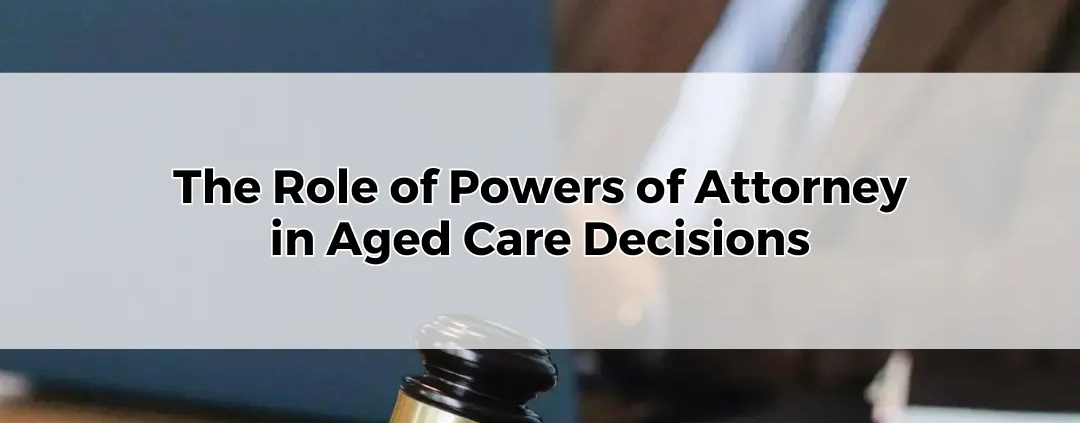The Role of Powers of Attorney in Aged Care Decisions
Table of Contents
ToggleAging brings a myriad of challenges, and one of the most significant is making decisions regarding care and financial management. Powers of Attorney (POA) are crucial legal instruments that ensure these decisions are made in the best interest of the elderly, safeguarding their autonomy and wellbeing.
Understanding Powers of Attorney
Definition and Purpose
A Power of Attorney is a legal document that allows an individual (the principal) to appoint someone else (the attorney) to make decisions on their behalf. This arrangement is essential for those who may become unable to make decisions due to age or illness.
Types of Powers of Attorney
There are several types of Powers of Attorney, each serving different purposes. General POA grants broad powers, while Enduring POA remains effective even if the principal loses mental capacity. Specific POA is limited to particular decisions or timeframes.
Importance of Powers of Attorney in Aged Care
Ensuring Autonomy
POAs are vital in maintaining the autonomy of elderly individuals by ensuring their preferences and values are respected when they cannot voice them themselves. It provides peace of mind that their affairs are in capable hands.
Legal Protections
Having a POA in place offers significant legal protections. It ensures that decisions made on behalf of the principal are legally binding and recognised, preventing potential disputes and unauthorised actions.
Types of Decisions Covered
Financial Decisions
POAs cover a wide range of financial decisions, including managing bank accounts, paying bills, and handling investments. This ensures that the financial needs of the elderly are met without disruption.
Healthcare Decisions
Healthcare POAs empower the attorney to make medical decisions, from routine treatments to critical end-of-life care, ensuring that healthcare preferences are honored.
Choosing the Right Attorney
Qualities to Look For
Selecting the right attorney is paramount. Look for someone who is trustworthy, responsible, and understands the principal’s values and wishes. Good communication skills and the ability to make sound decisions under pressure are also critical.
Potential Conflicts of Interest
Be aware of potential conflicts of interest. It’s important to choose someone who will act in the best interest of the principal, without personal gain influencing their decisions.
Setting Up Powers of Attorney
Legal Requirements
Setting up a POA involves legal procedures that vary by jurisdiction. Generally, it requires the principal to be of sound mind when appointing the attorney, and the document must be signed and witnessed properly.
Documentation Process
The documentation process includes drafting the POA, detailing the powers granted, and any limitations. Legal advice is often recommended to ensure the document meets all legal standards and accurately reflects the principal’s wishes.
Role of Powers of Attorney in Healthcare
Medical Treatments and Procedures
An attorney under a healthcare POA can consent to or refuse medical treatments, ensuring that the principal’s healthcare preferences are followed. This includes decisions on surgeries, medications, and other treatments.
End-of-Life Care
End-of-life decisions are particularly sensitive. A healthcare POA ensures that the principal’s wishes regarding life support, resuscitation, and palliative care are respected and implemented.
Role of Powers of Attorney in Financial Matters
Managing Assets
An attorney with financial POA can manage the principal’s assets, including real estate, investments, and personal property. This ensures that the principal’s financial affairs are in order and their assets are protected.
Paying for Care
Financial POAs are crucial for managing payments for aged care services, ensuring that the principal receives the necessary care without financial stress.
Revoking or Changing Powers of Attorney
Legal Procedures
A principal can revoke or change a POA as long as they are mentally competent. This involves notifying the attorney and any relevant institutions, and updating the legal documentation accordingly.
Common Reasons for Changes
Changes to a POA might be necessary due to changes in relationships, the attorney’s availability, or the principal’s preferences. Regular reviews are recommended to ensure the POA remains suitable.
Challenges and Considerations
Family Disputes
POAs can sometimes lead to family disputes, particularly if there are disagreements about the decisions being made. Clear communication and legal guidance can help mitigate these conflicts.
Capacity Assessments
Determining the principal’s mental capacity can be challenging. Capacity assessments by medical professionals are often required to establish whether a POA should be activated or revoked.
Case Studies and Examples
Positive Outcomes
Case studies often highlight the positive impact of POAs. For instance, a well-chosen attorney can seamlessly manage an elderly person’s finances and healthcare, ensuring they receive the best possible care.
Lessons Learned from Mistakes
Conversely, mistakes in setting up or managing a POA can lead to significant issues. These examples underscore the importance of careful selection, clear documentation, and ongoing oversight.
Legal and Ethical Implications
Balancing Autonomy and Protection
The ethical challenge in POAs is balancing the principal’s autonomy with the need for protection. The attorney must navigate this balance, respecting the principal’s wishes while making prudent decisions.
Ethical Considerations
Ethical considerations include acting without bias, avoiding conflicts of interest, and making decisions that truly reflect the principal’s values and preferences.
Seeking Professional Advice
Legal Experts
Engaging legal experts ensures that the POA is properly drafted and legally sound. They can provide valuable guidance on the legal intricacies and requirements.
Financial Advisors
Financial advisors can help manage the principal’s assets effectively, providing advice on investments, tax implications, and long-term financial planning.
Conclusion
Powers of Attorney play an indispensable role in aged care decisions, ensuring that the financial and healthcare needs of the elderly are met with respect and diligence. By carefully selecting an attorney, understanding the scope of their powers, and seeking professional advice, individuals can ensure their wishes are honored and their well-being safeguarded.









